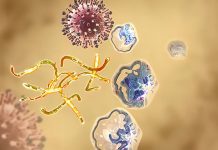
Research into the health benefits of coffee has found that drinking two to three cups of coffee per day can lead to a longer lifespan and a lower risk of cardiovascular disease.
The research was presented at the European Journal of Preventive Cardiology and published in the ESC journal.
“In this large, observational study into the health benefits of coffee, ground, instant and decaffeinated coffee were associated with equivalent reductions in the incidence of cardiovascular disease and death from cardiovascular disease or any cause,” said study author Professor Peter Kistler of the Baker Heart and Diabetes Research Institute, Melbourne, Australia.
“The results suggest that mild to moderate intake of ground, instant and decaffeinated coffee should be considered part of a healthy lifestyle.”
A new approach to researching the health benefits of coffee
Prior to this research, there was little information on the health benefits of coffee that considered how the coffee was prepared and the impact it may have on heart health and survival. In this study, the researchers analysed the association between different types of coffee and cases of cardiovascular disease, arrhythmias, and death. The researchers used data from the UK Biobank and were made up of participants aged between 40 and 69 years. The forms of cardiovascular disease that were considered included coronary heart disease, congestive heart failure and ischaemic stroke.
The study examined 449,563 participants who had no history of arrhythmias or another cardiovascular disease. The median age of the participants was 58 years and 55.3% were women.
The participants completed a questionnaire asking how many cups of coffee they drank per day, they also asked whether they drank instant or ground coffee and if they drank decaffeinated coffee. The participants were then placed into six groups based on their daily intake. The groups were categorised by those who drank none, less than one, one, two to three, four to five, and more than five cups of coffee per day.
Moderate coffee consumption is best
The most common type of coffee consumed was instant, with 198,062 participants (44.1%) mostly drinking instant coffee. Furthermore, 82,575 (18.4%) drank mostly ground coffee and 68,416 (15.2%) drank mostly decaffeinated coffee. The researchers also included 100,510 (22.4%) non-coffee drinkers as a comparison.
It was also reported that 27,809 (6.2%) of participants died during the study follow-up.
Evidence supporting the health benefits of coffee was found in all subgroups of coffee preparation. Each form of coffee was linked to reductions in death from any cause. The largest reduction in risk was observed in those who drank two or three cups of coffee per day. Compared to those who did not drink any coffee this was associated with a 14%, 27% and 11% lower likelihood of death for decaffeinated, ground, and instant preparations, respectively.
In total, 43,173 (9.6%) participants were diagnosed with cardiovascular disease during the follow-up period. All coffee preparations were linked to a reduction in cardiovascular disease risk. Once again, the lowest risk of was found in those who drank two or three cups per day. When compared to non-coffee drinkers this equated to a 6%, 20%, and 9% reduction in the likelihood of cardiovascular disease for decaffeinated, ground, and instant coffee, respectively.
Some form of arrhythmia was diagnosed 30,1000 (6.7%) of participants during the follow-up. Ground and instant coffee were associated with a reduction in arrhythmias, but no link was found in decaffeinated coffee. Compared with non-drinkers, the lowest risk was observed in those who consumed four to five cups a day of ground coffee and two to three cups a day of instant coffee, with 17% and 12% reduced risks, respectively.
Professor Kristen believes, that while caffeine may contribute to improvements in heart health, other biological components in the drink are key contributors to the health benefits of coffee.
“Caffeine is the most well-known constituent in coffee, but the beverage contains more than 100 biologically active components. It is likely that the non-caffeinated compounds were responsible for the positive relationships observed between coffee drinking, cardiovascular disease, and survival. Our findings indicate that drinking modest amounts of coffee of all types should not be discouraged but can be enjoyed as a heart-healthy behaviour,” she concluded.
























